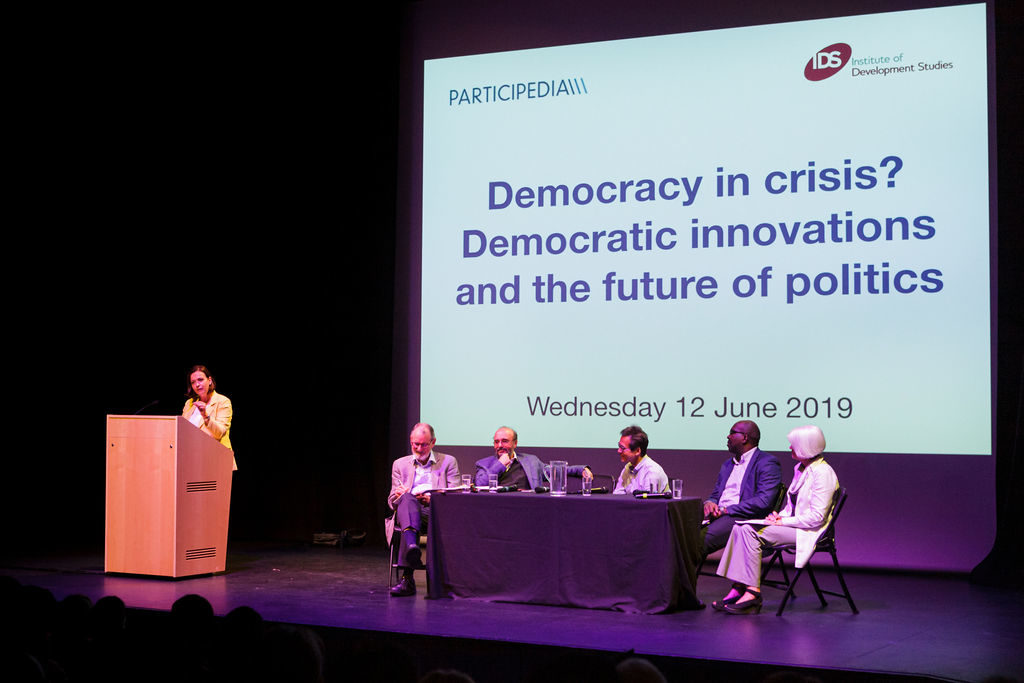Across the world, there is a new problem that we have in common: the crisis of democracy. But while this presents serious challenges, defining it as a global problem also opens up new pathways of learning from each other– not only about the nature of this crisis but also the solutions to counter it.

Democratic crisis as a global problem
Democracy is claimed to be in crisis across the globe. The growing body of evidence of this downward spiral includes: declining rates of voter participation, alienation or disaffection of citizens from the political process, loss of trust in politicians, political institutions or experts in general, the rise of national populism, and the misuse and abuse of social media – just to name a few.
While the discourse of democratic crisis usually adopts a pessimistic tone, the situation also presents exciting new opportunities. Sharing a common problem across the globe brings the world together in a different way. It suggests new sources of knowledge and opens up new ways of learning from each other’s experiences. Newspaper headlines such as ‘Want to see where Trump is taking America? Look at Turkey under Erdoğan’ is just one example of this new type of thinking and learning.
This learning is at its best when it focuses not only on the shared problems, but also the potential solutions. I recently took part in a panel discussing ‘Democracy in crisis? Democratic innovations and the future of politics’ hosted by Participedia and the Institute of Development Studies, which drew attention to some of these solutions.

Moving from problems to solutions: what kind of innovations are needed?
Many insights were shared in the panel discussions about the nature of democratic crisis and type of democratic innovations required to address it.
Here I focus on five recommendations that can be shared across different democracies.
- Democratic innovations should put citizens and their needs at the centre
Recent years have seen the proliferation of democratic innovations, such as participatory budgeting, across the globe. While this increased interest by organisations or institutions or even firms to adopt or experiment with innovate practices can be good news for democracy, it also calls for caution to ensure that the rapid top-down expansion of innovations from international institutions, such as World Bank does not become counter-productive.
Professor Leonardo Avritzer argued that democratic innovations can help to counter the current crisis of democracy only if they put the citizens and their needs back at the centre. It is important to remember what makes these innovations ‘democratic’ and resist their co-optation by powerful actors.
- Democratic innovations should not only focus on doing new things; they should also focus on doing old things in new ways
Democratic innovations are usually associated with new developing new practices and experiments. But while practices such as Citizens’ Assemblies offer new ways of doing things and enable some citizen input into decision-making processes, they are not enough on their own to confront the crisis of democracy.
As Professor Archon Fung argued, the root causes of the current crisis lie within the existing institutions and practices of representative democracy, necessitating urgent attention. There are many promising experiments showing how democratic innovations can be part of existing institutions and enable doing old things in new ways.
One recent example of this type of innovation is building a ‘directly representative democracy’ as suggested by Michael Neblo and his colleagues. In practice, it requires the sitting members of Congress to meet with their constituents via online deliberative town hall meetings to discuss important policies, which may in turn help restore citizens’ trust in politicians and political institutions.
- Democratic innovations should adapt to the changing communication environment
As I highlighted in my contribution to the panel, it is crucial that the innovations take into account the ever-changing environment of communication. The problem with contemporary democracies is not the lack of opportunities to speak up and out (both online and face-to-face), but the lack of listening and reflection.
In the age of communicative plenty, finding moments and spaces for political reflection is becoming increasingly more difficult for individuals, organisations and governments. In this context, designing spaces for listening, as in the case of Citizens’ Initiative Reviews, or Kitchen Table Conversations can provide promising ways of responding to democratic crisis.
- Democratic innovations should cater for everyone, not only for some people
One common criticism levelled against democratic innovations that they work only for the usual suspects: the few privileged citizens. In his contribution to the panel, Professor Bonny Ibhawoh emphasised the need for making democratic innovations that speak to everyone, not just to some people. This means learning and looking for solutions from the Global South, not just the problems.
For instance, over the past three decades more than 40 countries have been learning from South Africa’s model of Truth and Reconciliation Commissions to deal with the historic and contemporary tensions with Indigenous people. Canadian justice ended up following the South African model with some positive outcomes, offering a pathway for a truly inclusive innovation.
- Democratic innovations should draw on the lessons learnt from social movements
Democratic innovations are not just limited to designed forums, such as citizens’ assemblies or citizens’ juries. There are many other democratic practices which can serve as a resource and inspiration for democratic innovations. The way social movements enact democracy is a case in point. Professor Melissa Williams suggested that, to counter the crisis of democracy, we need to hang on to the lessons learnt from the Occupy movement.
Occupy showed the possibility of mobilising democracy transnationally to respond to global collective action problems, offering insights for enabling democratic renewal today. We can learn from these movements today. This is what the Indivisible movement in the US has achieved, emerging in response to Trump’s election. Indivisible contributed to the rising voter turnout and the mounting of new candidates in the 2018 congressional elections by joining the decentred horizontal network structures of Occupy to national democratic institutions. As such it also offered a successful example of ‘doing old things in a new way’.
As one final consideration – while none of these insights provide quick fixes for addressing the crisis of democracy, they provide powerful directions for re-imagining and reforming democracies in more inclusive, participatory and deliberative ways.
Dr Selen Ercan is an Associate Professor of politics at the Centre for Deliberative Democracy and Global Governance, University of Canberra. Her works sits at the intersection of normative democratic theory and empirical political research examining a wide range of topics including the politics of inclusion and exclusion in multicultural societies and the prospects for public deliberation in the face of value conflicts. Selen’s recent publications on these topics have appeared in various journals including International Political Science Review, Policy and Politics, Social Movement Studies and Critical Policy Studies.
Twitter: @selenAercan @DeldemUcan @UniCanberra @participedia
This blog has also been published by Participedia on Medium.
Watch the full panel discussion, which was streamed on Facebook.